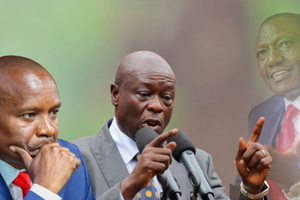
The AP investigation concludes that the Kremlin is recruiting the young African women to fill an urgent labour shortage in Russia.
I read from a recent investigative report by the Associated Press (AP) about how Russia has been recruiting young women between the ages of 18 – 22 from several African countries, including Kenya, Rwanda, South Sudan and Nigeria, to work in a special economic zone at a place called Alabuga where they are employed in factories assembling weapons of war.
The young women are lured through social media ads that promise them a free plane ticket, money, and a faraway adventure in Eastern Europe. All that is required is that you complete a computer game and to pass a low-word Russian vocabulary test.
The AP report says that they are engaged while unaware that they would be toiling in a factory to make weapons of war, assembling thousands of Iranian design attack drones to be launched into Ukraine.
According to the report by the AP, the young women work in exploitative conditions – long working hours, low wages, and limitation on freedom of movement.
This whole report brings to the fore the issue of abusive and exploitative recruitment of migrant labour from Kenya. How safe are our youth, especially those who work in jurisdictions renowned for abuse of workers’ rights in the Gulf States and Middle East? Is it a surprise that Kenya’s name features in this list of shame?
The truth of the matter is that our systems for mapping risk to migrant workers and for monitoring exploitation of our citizens who work abroad simply don’t work. We don’t keep accurate statistics on migrant workers and are therefore unable to determine and map citizens who are in need of protection.
Bilateral migration agreements
On paper, government spokesmen often tout how we have a tight legal and institutional framework for governing migration of low-skilled workers to Europe and the Middle East.
Kenya has signed bilateral migration agreements with Saudi Arabia, the UAE, and Qatar and is currently in the process of negotiating similar agreements with Bahrain, Kuwait, Oman and Jordan. We have labour attaches in several missions who are tasked to monitor the rights of migrant workers.
Government spokesmen tout how a system and law for regulating unscrupulous recruitment agencies is in place and is under constant revision. As a matter of fact, there was a time when the government banned recruitment agencies. At one point, the government announced that a total of 65 recruitment agencies had been accredited under a new and strict regulatory regime.
Just the other day, Ministry of Labour mandarins were on top of the roof trumpeting how the government had established an inter- ministerial committee to vet all recruitment agencies.
Kenya is a signatory to the UN protocol to suppress and punish trafficking of persons especially children and women of 2005.
Clearly, and from the revelations contained in the AP investigation show that laws and systems are honoured more in breach than in practice.
How can we claim to have watertight and transparent systems of recruitment of migrant labour when the Russians are able to recruit teenage girls to work for them in sweatshops through Tik Tok and Facebook?
In other jurisdictions, unskilled labour migration cannot happen before the workers are given, pre- employment, pre- departure and post- arrival orientation.
AP investigations
The AP investigations found that many young women only learnt about what the jobs they had been invited for entailed after they arrived in the factories at the Alubaga special economic zones. The have to travel daily between the factory and their living quarters by bus, passing through multiple security checks.
Why are our young people made to endure such ignominy? If you asked me to name the biggest failure and shortcoming economic policy-making in Kenya today, I would cite failure to register the gravity and threat to the stability of the state of the youth unemployment problem.
In all major policy documents, the gravity of the problem is acknowledged. At every opportunity, the determination to resolve the problem is proclaimed. But this is never really reflected in actual policies especially at the operational level.
Unemployment and conditions of labour are not taken seriously by either civil society or the political elite. You hardly see or hear about political agitation against unwarranted job cuts or trade unions organising the working class to protest against looming retrenchment of workers by corporates. Instead, retrenched employees are advised to seek counselling.
Back to the Alabuga special economic zones. The AP investigation concludes that the Kremlin is recruiting young African women to fill an urgent labour shortage in wartime Russia. It seems to me that Africa is unwittingly and indirectly being drawn to support the Russians in the Ukrainian war.










